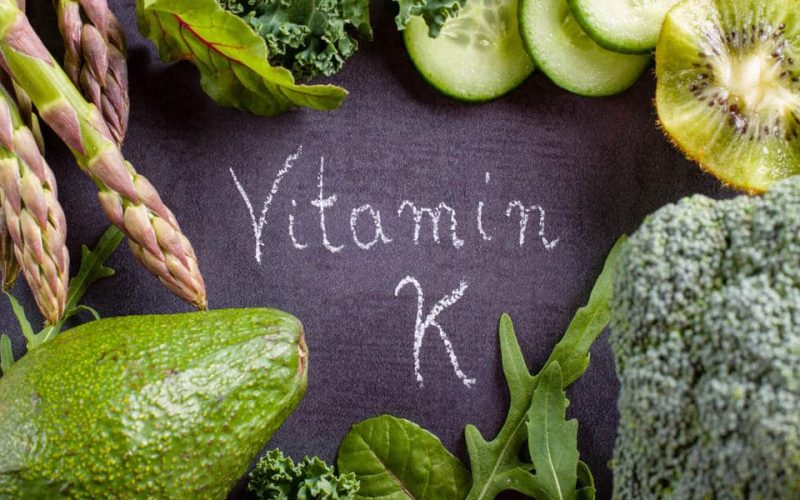Vitamin K is the name for a group of vitamins that are fat double and play a major role in blood clotting, regulation of blood calcium levels, and bone metabolism.
The human body requires vitamin K to make prothrombin, a clotting and protein factor that is vital in bone metabolism and blood clotting.
People who make use of blood-thinning pills like Coumadin, or warfarin, should not begin the consumption of any additional vitamin K unless prescribed by a doctor.
Vitamin K deficiency is a very rare condition, but in extreme cases, it can lead to an increase in blood clotting time, which causes excessive bleeding or haemorrhage.
Vitamin K1, or phylloquinone, is derived from plants. K1 is the primary type of dietary vitamin K. A lesser source of vitamin K is vitamin K2 which is also known as menaquinone, and it occurs in some animal-based foods and fermented foods.
Uses of vitamin k
Phylloquinone, which is also known as vitamin K1, is derived from plants. When consumed, the bacteria present in the large intestine changes it to its storage form, which is vitamin K2. This vitamin k2 is then absorbed in the small intestine before it is stored in the liver and in fatty tissue.
Without the presence of vitamin K, the body is unable to produce prothrombin, which is a clotting factor that is vital for bone metabolism and blood clotting.
Most Americans get enough vitamin K, thus they are not at risk of its deficiency. Vitamin K deficiency is most likely to affect newborns and people with a malabsorption problem, as a result of short-bowel syndrome, celiac disease, cystic fibrosis, or ulcerative colitis.
Normally, newborns are given a vitamin K injection to guard them against bleeding in the skull, which could be a fatal thing.
The recommended daily vitamin K intake depends on gender and age. Women who are aged 19 years and above are to consume 90 micrograms (mcg) of vitamin K a day, and men should consume 120 mcg a day.
Benefits of vitamin K
Vitamin K benefits the human body in a variety of ways.
Bone health
There seems to be a link between low vitamin K intake and osteoporosis.
Several pieces of research have suggested that vitamin K provides support for the maintenance of strong bones, it improves bone density and also lowers the risk of fractures. Nevertheless, studies are yet to confirm this.
Cognitive health
Increased levels of vitamin K in the blood have also been linked with better episodic memory in aged people.
In one research, healthy people who were above the age of 70 years and also had the highest vitamin K1 blood levels had the highest performance of verbal episodic memory.
Heart health
Vitamin K is also great for the heart as it may help to keep the blood pressure lower through the prevention of mineralization, where there is a build-up of minerals in the arteries. What this does it to enable the heart to freely pump blood through the body.
Mineralization is an occurrence that happens naturally with age, and it has been found to be a major risk factor for heart disease. The right intake of vitamin K has been discovered to also reduce the risk of stroke.
Sources of vitamin k
Vitamin K1 is easy to get in your daily diet especially if you are a vegetarian. This vitamin occurs in large amounts in leafy green vegetables, such as Swiss, kale, and chard. Some other sources of vitamin K include some fruits and vegetable oils.
Sources of menanoquines, or vitamin K2, include dairy products, meat, eggs, and Japanese “natto,” which is made from fermented soybeans. Below is a sample of some food sources of vitamin K:
- a 3-ounce serving of natto contains 850 mcg of vitamin k
- 10 sprigs of parsley contain 90 micrograms (mcg) of vitamin k
- one cup of raw spinach contains 145 mcg
- a half-cup serving of frozen and boiled collard greens contains 530 mcg
- a half-cup serving of grapes contains 11 mcg
- a hard-boiled egg contains 4 mcg
- 1 tablespoon of soybean oil contains 25 mcg
Most adults in the U.S. are believed to consume enough vitamin K.
Recipe tips
The healthy recipes below have been specifically developed by a professional dietitian . They are guaranteed to increase your daily vitamin K intake.
- Powered-up spinach lasagne
- Baked halibut with garlicky kale & toasted cashews
- Spinach-pesto salad
- Roasted Brussels sprouts with toasted pecans & avocado
Dietary fat helps to promote the absorption of vitamin K, which means that a simple salad of green leaves, with nicely drizzled olive oil, will not only provide you with vitamin K but also help the body absorb it.
Risks
At present, no tolerable upper limit for vitamin K has been determined. Toxicity is, however, very rare. And it is also unlikely to result from the consumption of foods containing vitamin K.
However, it is important to note that taking any type of vitamin K supplement can lead to toxicity.
It is possible for vitamin K to interact with several common medications, such as blood thinners, antibiotics, anticonvulsants, weight-loss drugs, and cholesterol-lowering drugs.
Blood thinners, like warfarin, are used for the prevention of harmful blood clots which as capable of blocking the blood flow to the heart or brain. These medications work by delaying or decreasing vitamin K’s clotting ability.
Thus a sudden decrease or increase in the vitamin K intake can interfere with the effects of these medications. Keeping your daily vitamin K intake consistent from can help to prevent these problems.
Anticonvulsants, if used while breastfeeding or during pregnancy, can cause an increase in the risk of a vitamin K deficiency in a newborn or a fetus. Some examples of anticonvulsants are Dilantin and phenytoin.
Medications for lowering Cholesterol levels may interfere with fat absorption. Also, dietary fat is vital for the absorption of vitamin K, thus individuals who are using this medication may be exposed to a higher risk of deficiency.
If you or anyone you know are taking any of these medications, it is vital that you or such a person speak to a doctor about your intake of vitamin K.
Finally, the best way you can ensure that your body gets sufficient nutrients is to feed on a balanced diet, with lots of fresh fruit and vegetables.
While people love to take supplements, they should only be bought for use in case of vitamin K deficiency, and even then, under professional medical supervision.








